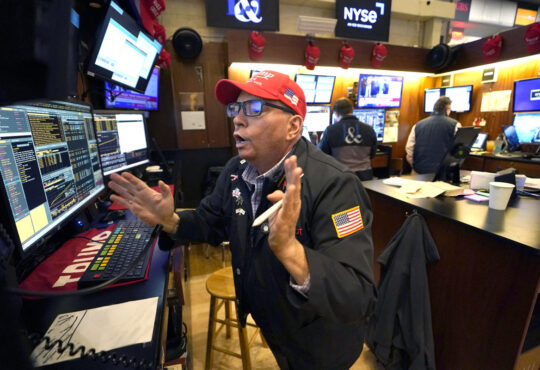
Business students see big returns in virtual Stock Market Game – News
Students in the Lundy-Fetterman School of Business’ ECON 202-Principles of Macroeconomics and ECON 420-Money courses recently participated in an exhilarating stock market simulation, achieving impressive returns on their virtual investments.
Over the course of 13 weeks, participants were tasked with developing successful investment portfolios, investing a virtual $100,000 in real-world stocks, ETFs, mutual funds and cryptocurrencies traded on NYSE, NASDAQ and Canadian exchanges. The top four students (pictured) were Joseph Richter, Charlie Blizzard, Lexi Goff and Israel Yaw.
To succeed in the competition, students had to actively trade, including buying, selling and engaging in at least one short sell and short cover transaction per reporting period. They utilized a variety of resources including class lectures, textbook materials, Wall Street Survivor’s courses, investing ideas, websites, videos and a wide array of print and online sources to prepare and submit their investment portfolio reports online.
Using HOWTHEMARKETWORK.COM trading room platform, students participated in the semester-long Stock Market Game, tracking their progress with real-time stock prices, portfolio performance, and class rankings. HTMW.COM site is widely used, with more than 1,300 professors, 60,000 students and 80 percent of the top business schools in thirty countries incorporating them into their classes each year.
Dr. Shahriar Mostashari, associate dean for external relations, announced the top performers for this year’s competition.
“This semester, our participants demonstrated exceptional effort, strategic thinking and a strong eagerness to learn about the financial markets,” he said.
1st Place: Joseph Richter: Joseph Richter, a senior from Apex, North Carolina, majoring in Business Administration, secured first place with an impressive portfolio value of $122,764.99, reflecting a 22.76% increase. Joseph found the Stock Market Game both educational and enjoyable. It helped him better understand stock market fluctuations and terminology while fostering conversations with family and friends. His most profitable trade was in CrowdStrike (CRWD), though Netflix (NFLX) turned out to be his costliest trade. His success demonstrates his ability to capitalize on profitable opportunities while learning to navigate market challenges.
2nd Place: Charlie Blizzard: Charlie Blizzard, a sophomore from Greenville, North Carolina, majoring in Trust and Wealth Management, claimed second place with a portfolio value of $121,708.85, representing a 21.71% increase. Entering the competition with no prior experience, Charlie found the Stock Market Game instrumental in developing his investment strategy. He gained valuable insights into riskier trades and learned to discern which strategies to apply in the real market. His most profitable trade came from purchasing Tesla shares just before their sharp increase in late November. Blizzard’s journey highlights the game’s value as a learning tool in a risk-free environment.
3rd Place: Lexi Goff: Lexi Goff, a senior from Wyoming, Delaware, majoring in Economics Pre-Law, earned third place with a portfolio value of $120,718.08, reflecting a 20.72% increase. Lexi approached the competition with a diversified strategy, balancing investments in electronic technology and consumer services. She found the Stock Market Game to be an interactive and beneficial learning experience, allowing her to study the market and create her portfolio. Her most profitable trade was in Google, while Apple proved to be the most challenging. Goff’s thoughtful portfolio design and analytical skills set her apart.
4th Place: Israel Yaw: Israel Yaw, a junior from Georgetown, Guyana, majoring in Business Administration, finished in fourth place with a portfolio value of $114,956.75, representing a 14.96% increase. Israel described his experience with the Stock Market Game as highly educational, deepening his understanding of market concepts such as supply and demand and the representation of ownership through stocks. His most profitable trade was in Spotify, while Costco turned out to be the costliest. Yaw’s growth throughout the game reflects his dedication to learning and improving.
“This semester’s Stock Market Game Competition was an incredible journey of learning and discovery,” said Dr. Mostashari. “Our winners have shown that success in the financial markets requires both strategic thinking and adaptability. Whether through recognizing trends, diversifying portfolios, or reflecting on costly trades, each participant has gained valuable insights that will serve them well in their academic and professional journeys.”
Student Led Investment Funds (SIF):
The business school is fortunate to have two SIFs aimed at two different audiences. The Burt Family SIF is embedded in an advanced Finance course as a capstone investment experience. Student teams often present their results in SIF competitions around the country. The Schaffernoth SIF is the focal point of the Finance Club which is open to first-year LFSB students and all students from around campus interested in investing or knowing more about investing.




